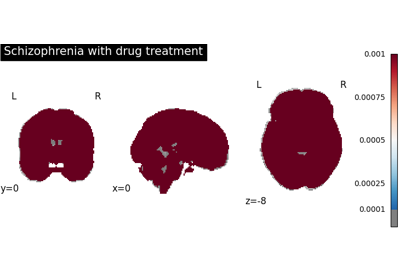nimare.meta.cbmr.CBMREstimator
- class CBMREstimator(group_categories=None, moderators=None, mask=None, spline_spacing=10, model=<class 'nimare.meta.models.PoissonEstimator'>, penalty=False, n_iter=2000, lr=1, lr_decay=0.999, tol=1e-09, device='cpu', **kwargs)[source]
Bases:
EstimatorCoordinate-based meta-regression with a spatial model.
New in version 0.1.0.
- Parameters:
group_categories (
stror obj:list or obj:None, optional) – CBMR allows dataset to be categorized into mutiple groups, according to group categories. Default is one-group CBMR.moderators (
stror obj:list or obj:None, optional) – CBMR can accommodate study-level moderators (e.g. sample size, year of publication). Default is CBMR without study-level moderators.model (:
GeneralLinearModel, optional) – Stochastic models in CBMR. The available options arepenalty (the only available option is Firth-type) –
Currently –
penalty –
function (which penalizes likelihood) –
estimates. (by Jeffrey's invariant prior and guarantees convergent) –
spline_spacing (
int, optional) –bases (Spatial structure of foci counts is parameterized by coefficient of cubic B-spline) –
spacing (in CBMR. Spatial smoothness in CBMR is determined by spline) –
across (which is shared) –
x –
y –
dimension. (z) –
template). (Default is 10 (20mm with 2mm brain atlas) –
n_iters (
int, optional) – Number of iterations limit in optimisation of log-likelihood function. Default is 10000.lr (
float, optional) – Learning rate in optimization of log-likelihood function. Default is 1e-2 for Poisson and clustered NB model, and 1e-3 for NB model.lr_decay (
float, optional) – Multiplicative factor of learning rate decay. Default is 0.999.tol (
float, optional) – Stopping criteria w.r.t difference of log-likelihood function in two consecutive iterations. Default is 1e-2device (
string, optional) – Device type (‘cpu’ or ‘cuda’) represents the device on which operations will be allocated Default is ‘cpu’**kwargs – Keyword arguments. Arguments for the Estimator can be assigned here, Another optional argument is
mask.
- Variables:
masker (
NiftiMaskeror similar) – Masker object.inputs (
dict) – Inputs to the Estimator. For CBMR estimators, there is only multiple keys: coordinates, mask_img (Niftiimage of brain mask), id (study id), studies_by_groups (study id categorized by groups), all_group_moderators (study-level moderators categorized by groups if exist), coef_spline_bases (spatial matrix of coefficient of cubic B-spline bases in x,y,z dimension), foci_per_voxel (voxelwise sum of foci count across studies, categorized by groups), foci_per_study (study-wise sum of foci count across space, categorized by groups).
Notes
Available correction methods:
CBMRInference().Methods
fit(dataset[, drop_invalid])Fit Estimator to Dataset.
get_params([deep])Get parameters for this estimator.
load(filename[, compressed])Load a pickled class instance from file.
save(filename[, compress])Pickle the class instance to the provided file.
set_params(**params)Set the parameters of this estimator.
- fit(dataset, drop_invalid=True)[source]
Fit Estimator to Dataset.
- Parameters:
- Returns:
Results of Estimator fitting.
- Return type:
- Variables:
inputs (
dict) – Inputs used in _fit.
- classmethod load(filename, compressed=True)[source]
Load a pickled class instance from file.
- Parameters:
- Returns:
obj – Loaded class object.
- Return type:
class object
- set_params(**params)[source]
Set the parameters of this estimator.
The method works on simple estimators as well as on nested objects (such as pipelines). The latter have parameters of the form
<component>__<parameter>so that it’s possible to update each component of a nested object.- Return type:
self
